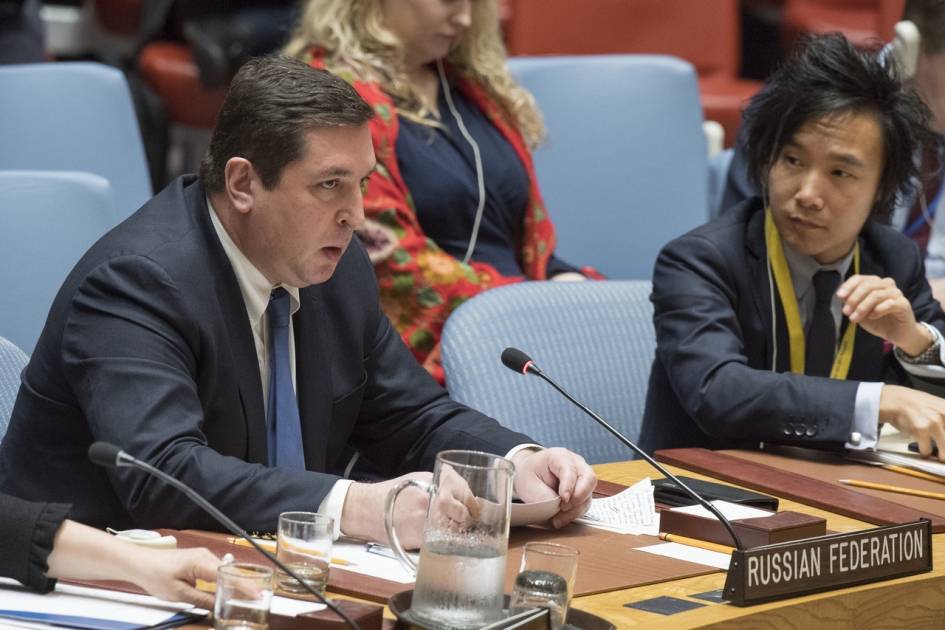Statement by Mr.Vladimir Safronkov, Deputy Permanent Representative of the Russian Federation to the United Nations, at the Security Council on the sitiation in the Middle East, including the Palestinian question
We thank Mr. Mladenov, Special Coordinator for the Middle East Peace Process, for his comprehensive and objective briefing.
The Middle East is going through a difficult period in its history, marked by many old and new crises. The conflicts in Syria and Yemen still need to be resolved.
Political and diplomatic solutions are needed. Further international efforts need to focus on resolving the situation in Libya, helping to rebuild Iraq and supporting stability in Lebanon. Palestine remains at the centre of the chaos that plagues the region and is the consequence of geopolitical experiments directed from abroad. That is a commonly agreed fact, despite the fact that some actors seek to relegate the issue of a settlement in the Middle East to the background.
The developments in the situation in the occupied Palestinian territories, where destructive trends are increasingly evident, are of grave concern. Owing to the lack of progress in the political process, a vacuum has been created that is being filled by unilateral measures and provocative rhetoric. The abyss of misunderstanding and mistrust is widening, undermining prospects for the resumption of talks. It is clear that all long-standing issues, including settlement activities, are far from being resolved.
We are concerned about the escalating tensions around Gaza associated with the Palestinian protests in the sector against the Israeli occupation since 30 March. There were dozens of victims on the Palestinian side and hundreds injured.
We support the right to peaceful protest and strongly condemn terrorist acts in any form and the indiscriminate use of force against civilians.
We call on the parties to refrain from measures that are likely to further exacerbate the situation. It is not necessary to be an experienced analyst to understand that it is highly likely that the situation will further deteriorate. The plan announced by the United States to hold a ceremony in Jerusalem on 14 May to mark the beginning of the transfer of the United States Embassy from Tel Aviv has a strong destabilizing potential, the negative repercussions of which will be seen not only in Palestinian-Israeli relations but also throughout the region and the entire Muslim world. That is not the only high-profile event related to the Middle East that will take place in the coming months.
Given the current situation, it is necessary for the international community to urgently step up its efforts for the resumption of the political process between the Palestinians and Israelis based on the principles of international law and aimed at the implementation of a two-State solution. Unilateral approaches will not lead to a fair and lasting peace, aimed at fulfilling the national aspirations of Palestinians or strengthen Israel’s security.
To that end, we are keeping on the table our proposal to convene a summit between the leaders of Palestine and Israel in the Russian Federation. We advocate the resumption of active efforts on the part of the Middle East Quartet of international mediators, which remains, regardless of what some may say, the sole mediation format approved by Security Council resolutions.
We believe that one of the obstacles to the resumption of the peace process is the schism within Palestinian ranks. We continue to deliver assistance to the Palestinians in their efforts to restore their national unity on the basis of the Palestinian Liberation Organization’s political platform and the Arab Peace Initiative.
It is important for all Palestinian stakeholders to reaffirm their commitment to implementing the agreements reached in Cairo in October 2017 and to focus their efforts on the establishment of the legitimate Palestinian National Authority in the Gaza Strip. We support the relevant efforts undertaken by the leadership of the Arab Republic of Egypt.
We support the delivery of international assistance to Palestinians. It is not acceptable to divert attention away from the humanitarian needs of the Palestinians or to cut financing for the relevant programmes, including throughthe United Nations Relief and Works Agency for Palestine Refugees in the Near East, which could lead to radicalization within the Palestinian ranks.
To summarize, we wish to stress that the Russian Federation advocates crafting a positive and unifying agenda for the international community as a whole to work on the Middle East, including the question of Palestine. We deem it necessary to conduct a joint analysis of the genesis of the conflicts plaguing the region and to seek alternative means for their settlement. In that context, we believe that the initiatives advanced in the past by Russia have not lost their relevance; on the contrary, they are all the more relevant now.
Recent events within and around the Middle East confirm the importance of Russian Foreign Minister Sergei Lavrov’s proposal to convene a comprehensive review of the situation in the Middle East in the Security Council.
It is also of critical importance to rebuild trust between the Arab world and Iran, to which end it is important to launch a process aimed at building a regional architecture for security that is comprehensive and indivisible. A key factor in that context is safeguarding the Joint Comprehensive Plan of Action on the Iranian nuclear programme.
On all of these and other issues, Russia stands ready to work together with interested partners in a transparent and impartial manner, without threats or undue pressure. Dialogue remains a key mechanism for resolving the issues at hand.
